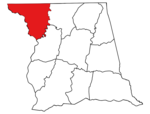North Carolina in the American Civil War

During the American Civil War, North Carolina joined the Confederacy with some reluctance, mainly due to the presence of Unionist sentiment within the state. A popular vote in February, 1861 on the issue of secession was won by the unionists but not by a wide margin. This slight lean in favor of staying in the Union would shift towards the Confederacy in response to Abraham Lincoln's April 15 proclamation that requested 75,000 troops from all Union states, leading to North Carolina's secession. Similar to Arkansas, Tennessee, and Virginia, North Carolina wished to remain uninvolved in the likely war but felt forced to pick a side by the proclamation. Throughout the war, North Carolina widely remained a divided state. The population within the Appalachian Mountains in the western part of the state contained large pockets of Unionism. Even so, North Carolina would help contribute a significant amount of troops to the Confederacy, and channel many vital supplies through the major port of Wilmington, in defiance of the Union blockade. Fighting occurred sporadically in the state from September 1861, when Union Major General Ambrose Burnside set about capturing key ports and cities, notably Roanoke Island and New Bern. In 1864, the Confederates assumed the offensive, temporarily reconquering Plymouth, while the Union Army launched several attempts to seize Fort Fisher. The last remaining major Confederate army, under Joseph E. Johnston, surrendered at Bennett Place, near Durham, to William Tecumseh Sherman in April 1865. Troops from North Carolina played major roles in dozens of battles in other states, including Gettysburg, where Tar Heels were prominent in Pickett's Charge.North Carolina would also raise troops to fight in Union regiments. The 3rd North Carolina Cavalry helped take part in the Battle of Bull's Gap, Battle of Red Banks, and Stoneman's 1864 and 1865 raids in western North Carolina, southwest Virginia, and eastern Tennessee. The Department of North Carolina, established in 1862, seized Wilmington in 1865, then the state's largest city. The North Carolina–based XVIII Corps was also among the largest in the Union Army.
Excerpt from the Wikipedia article North Carolina in the American Civil War (License: CC BY-SA 3.0, Authors, Images).North Carolina in the American Civil War
Low Water Bridge Road,
Geographical coordinates (GPS) Address Nearby Places Show on map
Geographical coordinates (GPS)
| Latitude | Longitude |
|---|---|
| N 35.5 ° | E -80 ° |
Address
Low Water Bridge Road
Low Water Bridge Road
North Carolina, United States
Open on Google Maps

